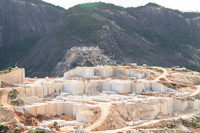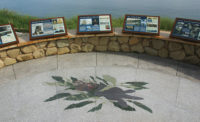Child labor and labor-trafficking are common across West Africa, although mass operations to rescue the victims are extremely rare. Under an accord signed in August, neighboring countries are cooperating to find and return children who have been forced into grueling and dangerous labor. The first rescue under the pact came on September 27, when authorities brought back 116 children who had been put to work in the granite quarries of southwest Nigeria. Most of these children worked at a granite quarry near Abeokuta, the hometown of Nigerian President Olusegun Obasanjo. Nigerian police feel that at least 6,000 children from Benin alone are still forced to work in the country's granite pits in the southwest.
CHILD LABORERS ARE RESCUED FROM NIGERIAN GRANITE QUARRIES
The Associated Press recently reported that 74 boys as young as four years of age were rescued from Nigerian granite quarries, where they were forced to work. Nigerian police rescued the boys on October 15 and repatriated them to Benin under an accord between the two nations on child trafficking and other cross-border crimes. Their rescue was only the second of its kind in West Africa, and the children told authorities that over the previous three months, at least 13 other boys died, succumbing to exhaustion, disease, hunger and abuse. “We would break the stones, and the men would come take them away in trucks,†one boy told The Associated Press. The children were prepared in Benin for eventual return to their families. The boys told social workers that quarry operators were gone when police arrived to free them. The Associated Press also reported that the children's parents had put them in the hands of labor traffickers for as little as $35, while the children themselves received 35 cents a day for breaking stones with mallets. Some had been working in the quarries up to four years.







